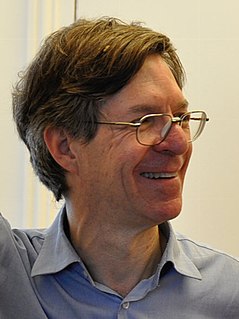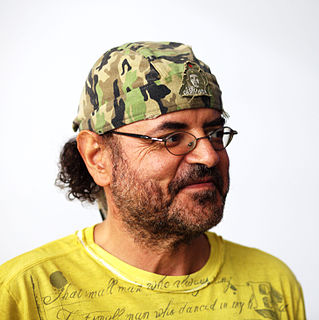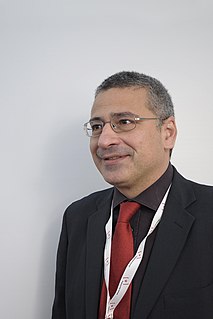
Alan David Sokal is a professor of mathematics at University College London and professor of physics at New York University. He works in statistical mechanics and combinatorics. He is a critic of postmodernism, and caused the Sokal affair in 1996 when his deliberately nonsensical paper was published by Duke University's Social Text. He also works to counter faulty scientific reasoning, as seen with his involvement in criticising the critical positivity ratio concept in positive psychology.
Michael Irwin Jordan is an American scientist, professor at the University of California, Berkeley and researcher in machine learning, statistics, and artificial intelligence. He is one of the leading figures in machine learning, and in 2016 Science reported him as the world's most influential computer scientist.

Vijay Virkumar Vazirani is an Indian American distinguished professor of computer science in the Donald Bren School of Information and Computer Sciences at the University of California, Irvine.

Christos Harilaos Papadimitriou is a Greek theoretical computer scientist, and professor of Computer Science at Columbia University.

Eduardo Daniel Sontag is an American mathematician, and Distinguished University Professor at Northeastern University, who works in the fields control theory, dynamical systems, systems molecular biology, cancer and immunology, theoretical computer science, neural networks, and computational biology.

Steven Lloyd Salzberg is an American computational biologist and computer scientist who is a Bloomberg Distinguished Professor of Biomedical Engineering, Computer Science, and Biostatistics at Johns Hopkins University. He is a member of the Institute of Genetic Medicine at Johns Hopkins School of Medicine, where he is also Director of the Center for Computational Biology.
National Center for Digital Government is a research center at the University of Massachusetts Amherst. The center is directed by Jane Fountain, professor of political science and public policy. Charles Schweik, associate professor of natural resources conservation and public policy, is the associate director of NCDG. The center, established with support from the National Science Foundation, focuses on the interface between technology, government and institutions.

David S. Eisenberg is an American biochemist and biophysicist best known for his contributions to structural biology and computational molecular biology. A professor at the University of California, Los Angeles since the early 1970s and director of the UCLA-DOE Institute for Genomics & Proteomics since the early 1990s, as well as a member of the California NanoSystems Institute (CNSI) at UCLA.
Bolesław Karol Szymański is a Professor at the Department of Computer Science and the Founding Head of the Center for Pervasive Computing and Networking, Rensselaer Polytechnic Institute. He's known for multiple contributions into computer science, including Szymański's algorithm.

Moshe Ya'akov Vardi is an Israeli mathematician and computer scientist. He is a Professor of Computer Science at Rice University, United States. He is the Karen Ostrum George Professor in Computational Engineering, Distinguished Service Professor, and Director of the Ken Kennedy Institute for Information Technology. His interests focus on applications of logic to computer science, including database theory, finite-model theory, knowledge in multi-agent systems, computer-aided verification and reasoning, and teaching logic across the curriculum. He is an expert in model checking, constraint satisfaction and database theory, common knowledge (logic), and theoretical computer science.

Alessandro Vespignani is an Italian-American physicist, best known for his work on complex networks, and particularly for work on the applications of network theory to the spread of disease, applications of computational epidemiology, and for studies of the topological properties of the Internet.
Bruce Randall Donald is an American computer scientist and computational biologist. He is the James B. Duke Professor of Computer Science and Biochemistry at Duke University. He has made numerous contributions to several fields in Computer Science such as robotics, Microelectromechanical Systems (MEMS), Geometric & physical algorithms and computational geometry; as well as in areas of Structural Molecular Biology & Biochemistry such as Protein design, Protein Structure Determination and Computational Chemistry.
Michael David Mitzenmacher is an American computer scientist working in algorithms. He is professor of computer science in the School of Engineering and Applied Sciences at Harvard University and was area dean of computer science July 2010 to June 2013. He also runs My Biased Coin, a blog about theoretical computer science.
Dragomir R. Radev is a Yale University professor of computer science working on natural language processing and information retrieval. He previously served as a University of Michigan computer science professor and Columbia University computer science adjunct professor. Radev serves as Member of the Advisory Board of Lawyaw.
Kathleen M. Carley is an American social scientist specializing in dynamic network analysis. She is a professor in the School of Computer Science in the Institute for Software Research International at Carnegie Mellon University and also holds appointments in the Tepper School of Business, the Heinz College, the Department of Engineering and Public Policy, and the Department of Social and Decision Sciences.
Noshir S. Contractor is a Jane S. & William J. White Professor of Behavioral Sciences in the School of Engineering, School of Communication and the Kellogg School of Management at Northwestern University, USA. He is the director of Sonic Lab and is also the director of Web Science Trust. In 2014, Professor Contractor was awarded the prestigious National Communication Association (NCA) Distinguished Scholar Award, honoring "a lifetime of scholarly achievement in the study of human communication."

Jane E. Fountain is an American political scientist and technology theorist. She is Distinguished University Professor of political science and public policy, the founder and director of the National Center for Digital Government at the University of Massachusetts Amherst, and formerly faculty at the John F. Kennedy School of Government at Harvard University. She is known for her work on institutional change and on the use of technology in governance.

Albert Y. Zomaya is currently the Chair Professor of High Performance Computing & Networking and Australian Research Council Professorial Fellow in the School of Information Technologies, The University of Sydney. He is also the Director of the Centre for Distributed and High Performance Computing,. He is currently the Editor in Chief of IEEE Transactions on Sustainable Computing and Springer's Scalable Computing and Communications. He was past Editor in Chief of the IEEE Transactions on Computers.
Michael Kearns is an American computer scientist, professor and National Center Chair at the University of Pennsylvania, the founding director of Penn's Singh Program in Networked & Social Systems Engineering (NETS), the founding director of Warren Center for Network and Data Sciences , and also holds secondary appointments in Penn's Wharton School and department of Economics. He is a leading researcher in computational learning theory and algorithmic game theory, and interested in machine learning, artificial intelligence, computational finance, algorithmic trading, computational social science and social networks. He leads the Advisory and Research function in Morgan Stanley's Artificial Intelligence Center of Excellence team.

Jukka-Pekka Onnela is a Finnish statistical network scientist. He is an Associate Professor of Biostatistics at the Harvard T.H. Chan School of Public Health and Director of the Health Data Science Program. Onnela is known for his pioneering research using cell phone data in network science. He was awarded the NIH Director's New Innovator Award in 2013 for his work in digital phenotyping.












